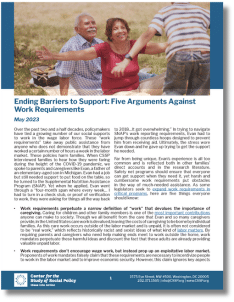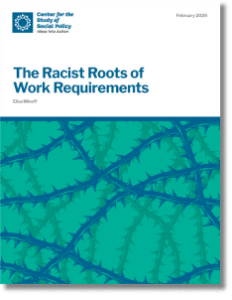
Today, the Administration of Children and Families published an interim final rule that creates a framework for how states will report employment and education outcome data for their Temporary Assistance for Needy Family (TANF) programs in the years to come. The rule is intended to implement the Fiscal Responsibility Act of 2023, which places new requirements on states to report on employment, earnings, and high school attainment of families after they stop receiving TANF.
The Center for the Study of Social Policy submitted comments to the agency’s Request for Information on this subject late last year, urging the agency to do as much as possible to limit the administrative burdens that collecting this data might place on families and recognize the significant “churn” among TANF participants when defining who leaves the program. As we know from our work in states, many families inadvertently lose TANF assistance due to administrative errors, and it can easily take two or three months—or more—for the family to be re-enrolled and their assistance to be reinstated. We are pleased to see that the interim final rule adopts our recommendations, and specifically defines a family who has exited TANF as one who has not received TANF assistance for at least 90 days.
Promoting work is one of the four purposes of the TANF program, and these new data collection requirements mark a welcome shift toward determining whether states are achieving this goal through meaningful outcome measures, as opposed to the current process measure of the Work Participation Rate, which is widely recognized as flawed by liberals and conservatives alike. CSSP has demonstrated time and again in our research and analysis that work reporting requirements do not help people find family-sustaining jobs, but instead take away assistance that is critical to families struggling to make ends meet, and are rooted in a long history of anti-Black racism going back to slavery.

Ending Barriers to Support: Five Arguments Against Work Requirements |

|
As we take this step forward, however, we must remember that the most important of TANF’s four purposes, from the perspective of families, is the program’s goal of providing cash assistance in times of economic crisis. States can and must be held accountable to how well they are achieving this goal. Meanwhile, we must look beyond TANF, and create a new federal program that provides unconditional cash assistance to families in need at all times—a meaningful, inclusive child allowance.


